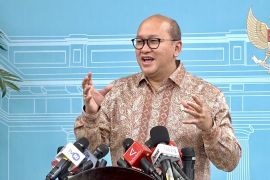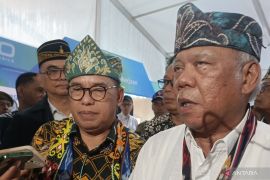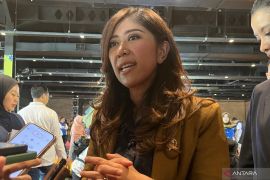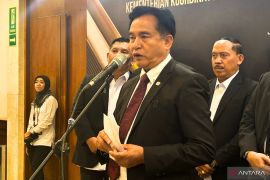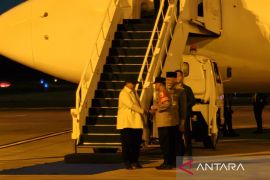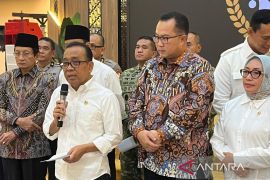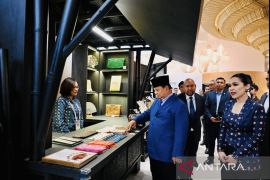The rupiah strengthening gave positive sentiment to the stock market. A significant increase was recorded in the share prices.Jakarta (ANTARA News) - The national currency rupiah made an upward leap early October giving rise to hope that the economy is on its way to recovery after months of being in the doldrums.
Rupiah traded at the level of 13,500 per US dollar - a strong gain from earlier level of 14,600.
The rebound came followed the government announcing a deregulation measure, the first of a series of four economic policy packages in a month.
The rupiah strengthening gave positive sentiment to the stock market. A significant increase was recorded in the share prices.
The sweeping economic reform is aimed at improving investment climate, accelerating implementation of development projects.
It widened the coverage of small business credits (KUR), simplified land licensing procedure for investment and labor pay system , credit implementation by the Export Financing Agency to prevent lay off.
Some observers attributed the the rupiah gain also to external factors such as the US economy falling short of expectation .
The U.S. central bank, the Fed, is expected to be forced to maintain stimulus to shore up that countrys flagging economy.
The US central bank, therefore, is not expected to raise its fund rate at least until end of this year.
The Fed was previously expected to raise its interest rate by 0.25 percentage point in December after being delayed from last month as originally planned.
The delay encouraged investors to acquire risk assets of developing countries including rupiah.
Observers and industrialists hope that the favorable condition could be maintained to create certainty in business and investment.
Senior Deputy Governor of Bank Indonesia Mirza Adityaswara the continued process of structural reform through the series of economic policy packages , improve the confidence of investors in the countrys economy and encouraged them to return to the domestic market.
The confidence of the investors was indicated by the appreciation of rupiah topping other currencies.
"Many people have said that the government was not serious in its pledge to carry out structural reform, but the accusation turned out to be false with the economic policy packages, which have attracted investors," Mirza said.
Several factors indicate that the countrys economic fundamentals are still quite strong -- inflation is under control with deflation of 0.05 percent recorded in September and inflation in calendar year at 2.24 percent (ytd), and year-on-year at 6.82 percent.
The central bank sees that the risk of macro economic stability has receded and the inflation in the whole year of 2015 is estimated to be less than 4 percent and current account deficit at 2percent.
In addition the delay in the FED raising its fund rate has resulted in strong inflows of investment into the domestic market.
By Oct 12 , 2015 net inflow of foreign capital reached US$249 million from net outflow in September 2015. In October, foreign investors were in the position of net supply�.
With the rupiah gaining, exporters began to sell their dollar creating balance in supply and demand. At the same time the share price index rose and yield improved.
Chief economist of PT Bank Negara Indonesia(BNI) Ryan Kiryanto attributed the rupiah gain and share price rise to the government policy package.
"The policy packages improve efficiency and recover the public confidence in the government," Ryan said.
Vice President Director of PT Pan Brothers Tbk Anne Patricia Sutanto also spoke favorably about the governments economic policy packages.
Most appreciable for the business sector in the policy packages are tax allowance, tax facility and cut in electric tariff for the industry, Anne said.
Short term
Analysts from LBP Enterprise Lucky Bayu Purnomo said the rupiah strengthening and share price index rise were only short term gain.
The Feds decision to delay raising its fund rate prompted investors to return to the risk financial markets.
However, the possibility is still wide open for the Fed to raise its fund rate at the next meeting of Federal Open Market Committee (FOMC), he said.
He said he hoped that investors would not be carried away by the short term gain.
"The governments policies do help much but global sentiments remain the main concern of investors," he said.
Meanwhile, financial market observer from Bank Himpunan Saudara, Rully Nova, said fundamentally, Indonesian economy still has fairly strong resilience.
Amid the global economic slowdown , there are still positive indicators such as foreign exchange reserve still above the international adequacy standard at US$101.7 billion by the end of September 2015.
In addition there was no significant inflationary pressure. Bank Indonesia is optimistic inflation would not exceed 4 percent this year.
The policy packages shown that the government is focused on recovering the investors confidence in the countrys economy.
However, the countrys economy has strong ties with global economy , and the threat to rupiah stability is still there, Rully said.
The country has to remain wary of external pressure including in launching economic structural reform, he said.
"Increase in the fund rate of the Fed could be a trigger for the dollar appreciation as investors would chose to keep their assets in the US dollar," he said.
External threat could also come from also the countrys largest trading partner, China, he said, adding if the worlds second largest economy continued to be hit by slump, Indonesias exports to that country would decline.
As a developing economy with high portfolio of foreign fund Indonesia is vulnerable to global economic pressure, he said.
Fortunately , the country has strong economic fundamentals, therefore, the government should take that opportunity to continue economic structural reform with greater determination and concrete steps, he added.(*)
Reporter: Ahmad Buchori
Editor: Heru Purwanto
Copyright © ANTARA 2015

